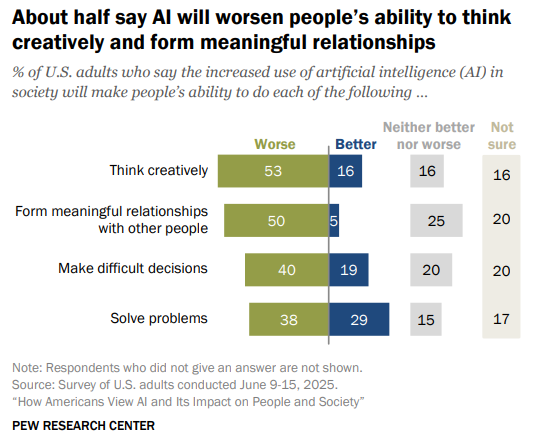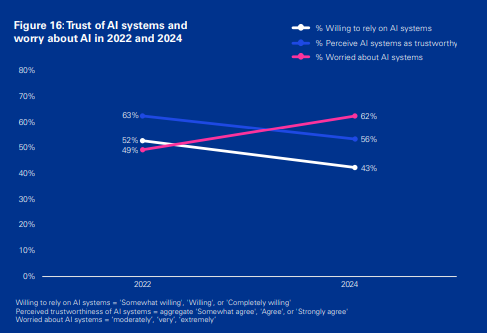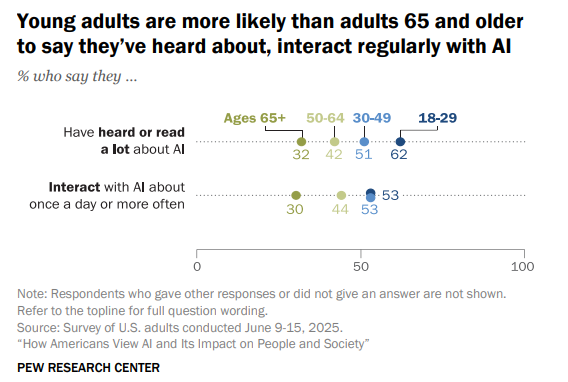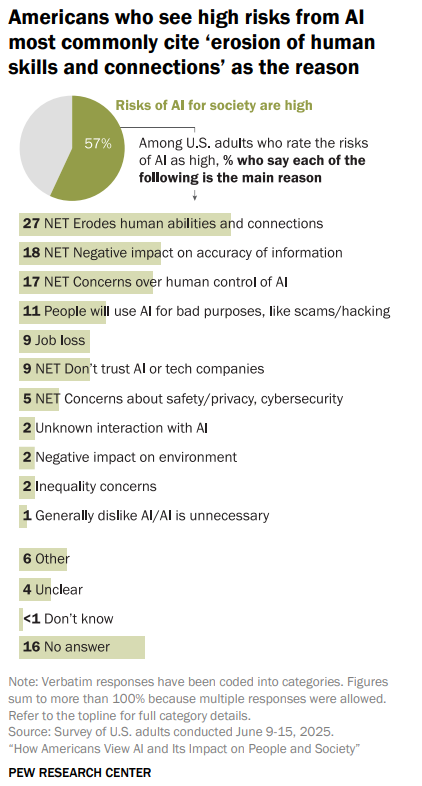美国人对人工智能渗透日常生活的担忧日益加剧,现有一半的人表示他们对这项技术的担忧超过了兴奋——根据皮尤研究中心的一项新调查,这一比例较四年前的37%大幅上升。
这项对5,023名美国成年人进行的研究于2025年6月进行,并于本周发布,揭示了一个国家正在应对的根本悖论:虽然73%的人表示愿意让人工智能协助日常任务,但61%的人同时希望对其在生活中的使用有更多控制。
一半的美国成年人表示,人工智能在日常生活中的使用增加使他们感到更担忧而非兴奋,而只有10%的人表示他们对人工智能的使用感到更兴奋而非担忧。
然而,美国人认为人工智能既是不可避免的,又对核心人类能力构成威胁。约53%的受访者表示,人工智能将恶化人们的创造性思维能力,而只有16%的人认为它会改善这一点。半数人认为人工智能会损害人们建立有意义关系的能力,只有5%的人期待人际关系的改善。


“我认为相当一部分人类倾向于寻求最小阻力的道路,”一位参与研究的女性告诉研究人员。“尽管困难和障碍可能令人烦恼和麻烦,但我相信经历这些事情并克服它们的过程对形成我们的性格至关重要。”
代际差异表明,年轻一代在日常生活中接触人工智能的机会越多。根据研究,62%的30岁以下的人表示他们听说或阅读过很多关于人工智能的内容,而65岁及以上的人中只有32%表示如此。
然而,这些年轻的美国人尽管对这项技术更为熟悉,却对其影响表现出更深的悲观情绪。61%的30岁以下成年人认为,社会中人工智能的使用增加将使人们的创造性思维能力变得更差,而65岁及以上的人中只有42%持这种看法。

美国人的不安反映了全球趋势。斯坦福大学的HAI人工智能指数报告 2025年确认,尽管人们欣赏人工智能的效率提升,但全球范围内的矛盾和担忧正在增加。这种紧张在发达国家尤为明显:在2022年,像英国(38%)、德国(37%)和美国(35%)等国家是全球最不可能认为人工智能的好处超过坏处的国家之一。
信任成为另一个关键的分歧点。虽然76%的人表示能够判断图片、视频或文本是由人工智能还是人类制作的极其重要或非常重要,但超过一半的人承认他们对自己实际做出这种区分的能力缺乏信心。这种信任缺口不仅限于内容检测:KPMG的2025年全球信任报告发现,自2022年以来,人们对人工智能公司的信任度一直在稳步下降。

皮尤研究的另一个有趣发现是,57%的美国人认为人工智能对社会的风险很高或非常高,而只有四分之一的人似乎对这项技术感到兴奋。
当被问及他们的担忧时,受访者最常提到的是人类能力和联系的侵蚀——人们变得懒惰,失去批判性思维能力,或过于依赖机器完成基本任务。

这种日益增长的警惕与皮尤研究中心今年早些时候对人工智能专家的调查形成了鲜明对比。根据一项先前的研究,人工智能专家比整体美国人更有可能认为人工智能在未来20年内对美国将产生非常或相对积极的影响(56%对17%)。
专家与公众之间的分歧反映了关于谁能从人工智能进步中受益的更深层次的紧张关系。学术研究显示,边缘化群体——少数族裔和残疾人——对人工智能的看法比一般人群更为消极,这表明这项技术的好处并未平等地惠及所有人。
换句话说,受到偏见或刻板印象影响的群体对人工智能技术的负面影响感知更为明显——而生成性人工智能模型往往会放大这些影响。
美国人确实在特定情境中看到了人工智能的有限作用——如天气预报、金融犯罪检测或药物开发。但他们在个人事务上划定了明确的界限。约73%的受访者表示,人工智能不应在关于信仰上给予人们建议,三分之二的人拒绝人工智能参与判断浪漫兼容性。
监管环境反映了这些担忧。盖洛普-SCSP 2025年研究发现,公众对更严格监管的支持压倒性,72%的人支持政府采取更多措施来控制该行业。
最终,57%的受访者表示他们在人工智能是否被用于他们的生活中几乎没有或完全没有控制权,这表明许多美国人已经感到这项技术的进步超出了他们的影响范围——这是一个他们既无法阻止也无法完全接受的数字潮流。
免责声明:本文章仅代表作者个人观点,不代表本平台的立场和观点。本文章仅供信息分享,不构成对任何人的任何投资建议。用户与作者之间的任何争议,与本平台无关。如网页中刊载的文章或图片涉及侵权,请提供相关的权利证明和身份证明发送邮件到support@aicoin.com,本平台相关工作人员将会进行核查。




